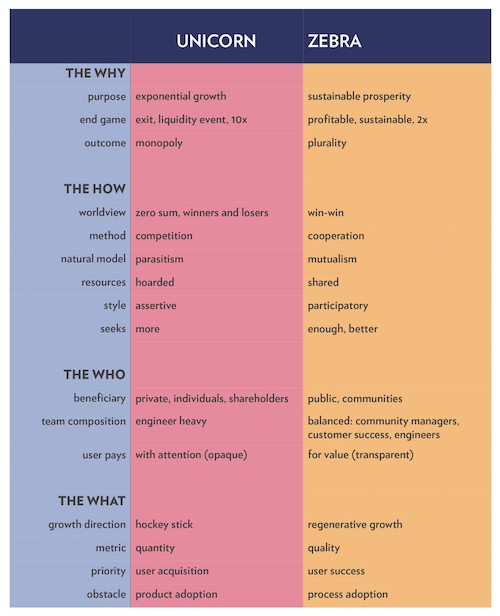IFTF and Zebras Unite Join Forces to Prioritize Social Good as Well as Profits

IFTF Joins Forces with Zebras Unite
To Focus New Investments on Prioritizing Social Good as Well as Profits
A new partnership between Institute for the Future and Zebras Unite aims to work with investors, policymakers and entrepreneurs to design new funding systems that encourage the creation of “zebra” companies, instead of “unicorns,” that are focused on integrating the goals of profitability and socio-economic equity.
Institute for the Future (IFTF) and Zebras Unite today announced a collaboration aimed at shifting the focus of venture capital investment to companies that prioritize profits and societal good. Their aim is to create new funding systems that lead to innovations addressing wealth inequality.
IFTF is a 50-year-old nonprofit strategic futures organization based in Palo Alto that help organizations and the public think systematically about the future to make better decisions in the present. Zebras Unite, founded by a group of women entrepreneurs, calls for a more ethical and inclusive movement to counter existing startup and venture capital culture.
As opposed to “unicorns” (private startups valued at over $1 billion), “zebra” is shorthand for a forward-thinking, long-game economy that promotes distributive business models that balance profit and purpose, champion democracy, and put a premium on sharing power and resources. Companies that create a more just and responsible society will hear, help, and heal the customers and communities they serve.
The two organizations will work with leading investors, foundations, policymakers, and legal experts to identify the barriers to these types of models, work directly with entrepreneurs to understand their funding needs and challenges, and design and promote mechanisms and policies to promote their growth.
 Leading funders like the Knight, Rockefeller, MacArthur, and Libra foundations; forward-thinking companies like Buffer; and visionary investors like Bryce Roberts of Indie.VC support the effort.
Leading funders like the Knight, Rockefeller, MacArthur, and Libra foundations; forward-thinking companies like Buffer; and visionary investors like Bryce Roberts of Indie.VC support the effort.
“The Zebra movement is a long overdue course correction for the industry,” said investor Bryce Roberts of Indie.VC. “It’s time to broaden the definition of entrepreneurship beyond unicorns to include the extraordinary founders and ideas so needed in these times. This partnership will create a more just, equitable, and humane ecosystem for the next generation.”
This builds on the momentum of DazzleCon, the inaugural Zebra conference in Portland, Oregon in 2017 that brought together over 250 entrepreneurs and funders to design a just future together. Zebras Unite now has 20 chapters in cities around the world, where founders, investors, and allies are creating grassroots networks to share resources and learn best practices from one another.
“We need to change how we assess value of entrepreneurial ventures,” said Marina Gorbis, executive director of Institute for the Future. “We want to reset the framework so people are investing in companies that are profitable but also help close the wealth gap, instead of continuing to widen it.”
Today, entrepreneurial investment focuses primarily on the search for new high-value private assets that drive wealth to a few investors and early stockholders. Venture funding of unicorns sets the standard, filtering out the vast majority of potential entrepreneurs, innovations, and most importantly, new entrepreneurial models built on public and open assets that offer an opportunity to address runaway inequality.
“Entrepreneurship is one of the most promising paths to economic mobility, and yet the resources to support existing and future entrepreneurs—from funding to training to public policy decisions— are controlled by a handful of decision makers,” said Mara Zepeda, co-founder of Zebras Unite and CEO of Switchboard. “The problem is not a scarcity of entrepreneurs but rather a lack of innovations that assure more distributed access to information and resources.”
Through the collaboration, IFTF and Zebras Unite will create a support system to advance long-term solutions and more distributed access to wealth by supporting zebra entrepreneurs across the world. Zebras Unite has 20 chapters in cities around the world, where founders, investors, and allies are creating grassroots networks to share resources and learn best practices from one another.
“Instead of solely looking at the bottom line, we need to direct capital flows to companies and ventures that benefit the larger society and are structured so as to provide economic returns to wider swaths in the population,” said Gorbis.
Acknowledgments
About Institute for the Future
Institute for the Future (IFTF) is celebrating its 50th anniversary as the world’s leading non-profit strategic futures organization. The core of our work is identifying emerging discontinuities that will transform global society and the global marketplace. We provide organizations with insights into business strategy, design process, innovation, and social dilemmas. Our research spans a broad territory of deeply transformative trends, from health and health care to technology, the workplace, and human identity. IFTF is based in Palo Alto, California. For more, explore www.iftf.org.
 About Zebras Unite
About Zebras Unite
Zebras Unite is a global network of entrepreneurs, funders, investors, and allies who are calling for a more ethical, inclusive, collaborative, distributed, and sustainable movement to transform prevailing startup and venture capital culture. We believe creating an alternative to the status quo is a moral imperative. For more, visit, www.zebrasunite.com.
Illustration by Julia Green.



